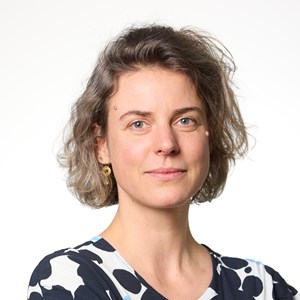The twin green and digital transitions open new opportunities for the European industry and citizens, in a quickly changing global scenario. But does Europe have what it takes? How can we make sure that it has the skills and the workforce to remain competitive in the global economy? And what is the role of standardization?
On the occasion of the European Year of Skills, we are conducting a special campaign: through a series of interview with standardization professionals, experts and business leaders coming from a variety of background, throughout the year we will explore the interaction between innovation, skills and standardization in some of the most relevant sectors for Europe’s long-term competitiveness.
For the third episode of this interview series, we interviewed Pauline Mourlon, standardization environmental leader at Schneider Electric, on the importance for companies to invest in standardization skills in the long term.
1. Please, present yourself. To what extent are you involved in standardization?
I am Pauline Mourlon, an engineer by education. I specialized in the study of the impact of human activity on the environment. Now I work at Schneider Electric, where I am Environment Standardization Leader for the business unit dedicated to industrial automation activities.
I represent Schneider Electric in international, European, and French standardization work on sustainability-related topics. More specifically, I focus on research into Ecodesign methods for material efficiency, in support of the circular economy.
2. How and why did you become involved in standardization?
My first approach to standardization was through regulation. I spent my first engineer study internship in the building sector. So, my first activities in the professional world consisted of helping manufacturers adapt to new environmental regulations, mainly French and European.
I was then introduced to the world of standardization in my end-of-study internship, at Schneider Electric. My early work at Schneider Electric involved the detailed analysis of environmental standards for Material Efficiency and comparing them with our company product design method.
This experience was no longer just about adapting to current regulations; it was also about proposing and creating methods to comply with upcoming regulations and requests. I had the great opportunity to be trained on standardization principles and objectives by two tutors, directly involved in standardization themselves.
Martial Patra, Standardization Manager and Chair of the CEN and CENELEC coordination group gathering the main European stakeholders, shared with me his knowledge and his vision of the general need for standardization on Ecodesign issues. He is also involved at the worldwide international level in product-specific standardization areas, making links with our European activities. This allowed me to also get a more global view of the environmental aspects.
Secondly, Thierry Cormenier, who is involved in product-specific committees too, was able to provide me with his vision and knowledge for technical topics and with his global standardization view, including the importance of specific and detailed consensus-based negotiations for the application of standards to products, systems, and services.
This training experience enabled me to understand the ability of technical experts to directly influence the drafting of new standards and to influence the overall European standardization strategies. It is this work of “knowledge passing” that has convinced me of the importance of investing in standardization for a company.
Following this collaboration, I became involved in standardization: I joined European and international technical committees, beginning my standardization activity on sustainability.
3. 2023 is the European year of skills. What added value or specific skills for your career do you think working in standardization has provided you with?
One of the main skills developed as a standards setter is the ability to gather ideas and reach for consensus. To practice this profession, you must always have both horizontal and vertical visions. To me, horizontal vision means understanding where standardization needs come from and what interests standards can serve. The vertical vision enables to make the link between the technical functions of industry, its capacity to create goods and services, and the strategic objectives of all other stakeholders involved in standardization.
Standardization is at the crossroads of several interlinked issues: the European Single Market, European legislative objectives, technological innovations, and the social and environmental needs of European Member States. All these different issues must be managed diplomatically. This means that standardizers are also experts in negotiation, to reach the necessary consensus to meet Europe’s needs, without excluding others. They must understand and retain the suggested ideas, and finally propose a common useful denominator, which is the final standard to apply.
4. For many companies, it is difficult to recognize the real value of investing in Standardization. How can that change?
I would say that the real value of investing in standardization can be seen in the long term. The potential from standards can drive new movements forward in specific fields, but only over long periods of preparation (anticipated studies and drafting) and application (stakeholders’ adaptation).
The involvement in standardization committees is particularly strong among international companies. On the contrary, SMEs are often involved in standardization just indirectly, thanks to the support offered by trade associations. SMEs may not see the real value of investing in standardization, because they are not invested in it directly, or have to invest too much money for direct participation. Then, companies only apply published standards. International companies, on the other hand, will be able to give their opinion and directly be implied by drafting standards under the complete CEN and CENELEC process.
Beyond the budget issue, larger companies are often able, thanks to their larger human resources, to take a strategic, longer-term view on regulation and standardization. To explain: the life cycle of a standard extends over 8 or 10 years, from its creation to its application and its impact on a business model. This means that standardization strategy, as part of a company's overall strategy, must be discussed regularly at the highest corporate level.
If companies recognize the real value of standardization, they need to know more about the standardization professions. One way of attracting them would be to offer training courses, explaining budget allocations, expert requirements, and long-term returns on investment. Conferences open for all people could initiate this training approach.
In addition to training, the idea of creating precise indicators on the potential impact of a standard on a business model, and warnings/information reported on issues based on incorrect application of a standard, could encourage all manufacturers to invest more and more in standardization.
5. How can the industry ensure the effective development of standardization skills and knowledge?
To develop skills and knowledge for standardization, it is essential for standardizers in the industry to stay in touch with technical functions and keep up to date with their company's know-how and state-of-the-art. In this way, they will be able to propose coherent standards in line with actual industrial capabilities.
Another important aspect is the sharing of knowledge. In my opinion, it is vital for standardizers to transmit their knowledge, and to maintain regular and fruitful contacts with other people in the field. Because of the unfavorable pyramid age in standardization, with a majority of senior experts or already retired people involved, the training of young and new standardizers must come from senior experts, to ensure that the necessary know-how is transmitted. In this way, companies can retain the skills they have acquired over time. On the other hand, young and new standardization experts also bring new knowledge, which will benefit senior experts. But this is effective only as part of a long-term company strategy and investment.
6. Climate change is complex challenge that is at the top of Europe’s priorities. Standards play a key role in achieving Europe’s green ambitions. What are the specific skills needed for standard-makers to be up to the task?
In my view, the specific skills needed for standard-makers for this topic is to be able to consider all environmental impacts at the same time. It's important not to focus just on one impact but to look beyond the CO2 impact, and to assess all the environmental consequences of a product's conception along its complete life cycle.
So, it is always important to take a step back from industrial activities. To understand environmental issues, I think it is also vital to understand the link between human activities and the dangerous issues they induce for their future living conditions. With such a vision, it is then possible to consider the needs and objectives of the economic market, while ensuring a drastic reduction in environmental impacts, and thus develop new standards in line with European and worldwide objectives.
In Europe, the Green Deal covers a very wide range of subjects, and numerous working groups are developing standards or guidance accordingly. These working groups are not necessarily and sufficiently interconnected. Environmental standardizers, therefore, must wear many hats to work in this field. Internal coordination within CEN and CENELEC, through more webinars and standards-related workshops, should make environmental standardization work less complex.
For now, in order to step-up European ambitions, some specific skills are necessary: first, standardizers need to have knowledge in many different domains – something that is not easy to achieve. They then need to have the ability to synthesize, as well as a general overview of all standardization activities. It is also crucial to identify the key issues at stake in the wider environmental work, between the needs from the market, the regulatory requirements, and the environmental limits we can reach.
7. Finally, what can CEN and CENELEC do to improve the participation of young and, more generally, new people in standardization?
During my education, I was given very little information about standardization, and very little about the importance of standards for the industry. It was only at the end of my schooling that I understood what a standard was, what influence it could have in the industrial sphere, and the very strong links it has with regulation. It might be interesting to invest time and resources in training young people and to offer lectures at universities to introduce them to standardization and its importance for every professional activity.
As I was saying before, senior experts must train young professionals by tutoring them. This approach may come directly from governments, or from CEN and CENELEC initiatives, to ensure that knowledge is transmitted, and that young people are well-trained. This can take the form of lectures at universities, or apprenticeships in companies.
If not already in place in certain countries, governments and Europe can also offer tax credits to hire standardization employees. This would make it easier for young professionals to get involved in standardization, and free up company budgets for training new experts.
This article is part of our special series dedicated to the European Year of Skills: through a series of articles and interviews with standardization professionals, experts and business leaders coming from a variety of background, throughout the year we will explore the interaction between innovation, skills and standardization in some of the most relevant sectors for Europe’s long-term competitiveness. You can read the other articles related to the campaign here.

Giovanni COLLOT
gcollot@cencenelec.eu



